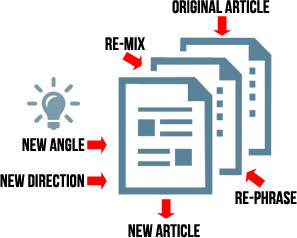So, you’ve landed a subject you’re passionate about. Moreover, you’ve done all your research, and the piece is on the road to publication. Maybe you’ve gotten it published in a local newspaper or magazine, but it probably shouldn’t stop there.
The key, as a professional writer (or an aspiring one), is to get the most mileage for the pieces you write. A little rewiring of the basic components, a new perspective, even reworking your original pitch can propel your story from its humble local beginnings to the national and international stage.
This makes sense not only from a financial perspective (often a national publication pays substantially higher rates than their local counterparts), it’s also a wonderful creative exercise worth exploring. Creative people often have to straddle the line between business and art. But, as you’ll see, you can embrace both sides.
1. Re-organize your localized angle
After taking a closer look at your story, make a list of its attributes:
- What makes it an appealing local story?
- What elements might be of interest to a wider audience?
Once your checklist is complete, find emergent patterns. For instance, perhaps you found something that was merely touched upon in the story that you can expand into a whole other angle.
Most of all, you’ll have to ask yourself this question: You’re going to have to dig in to find the value in it (and be critical of it as well). If you’re passionate enough about your subject matter, that passion’s going to come through in your query letter.
2. Nationalize your outlook
As you build your query letter, be sure to find a group of publications that fit your style of writing, subject matter, and interests. You’ll need to do your research.
- If they’ve published a story on “Celebrity Tweeting” six months ago, they’re probably not going to want another story on the subject, unless you can find a very unique angle.
- If your story’s a profile, many people are thrilled at doing another interview (especially if you mention the possibility of national coverage).
It’s like a second chance to revisit some things you might have wanted to flesh out. Although you might have had an easy time pitching your story locally, the competition is multiplied (by the hundreds), and you’ll likely encounter the obligatory, “Thank you for your interest in our publication, unfortunately, we have decided to pass on it,” response. That’s okay. Don’t sweat it. Move on.
3. Become a remix writer
 In most cases, editors are not seeking reprints of articles that have been published elsewhere. That means instead of sending off your original story, you’re going to face the blank page yet again, but that’s not an entirely useless thing.
In most cases, editors are not seeking reprints of articles that have been published elsewhere. That means instead of sending off your original story, you’re going to face the blank page yet again, but that’s not an entirely useless thing.
A writer that rewrites—or rather, remixes—his or her material will benefit from the experience. Think of it as a mirror universe version of your story. On the surface it’s going to appear to be exactly the same, but upon closer inspection, you’ll notice the differences. New phrasing, new direction—it should literally be a new story.
And, very important to note, avoid self-plagiarism. You should never lift passages from your previously published work and pass it off as original copy. While easy to understand for writers working on multiple projects, it’s an impulse that should be avoided. Start fresh. See your subject and subject matter in a renewed light. And as hard as that sounds, it gets easier the more you do it. Also, you’ll gain confidence.
4. Pitch it to the outfield (and beyond)
Don’t be afraid to shoot for the highest plateau. The New Yorker, The Atlantic, The Paris Review, The New York Times all have e-mail addresses that go directly to the fine editors of those publications.
Professional writing is all about risks. Before you convince yourself that a publication won’t be interested in your idea, draft an e-mail, polish it and send it off.
Remember: editors come and go, and although you might have hit several brick walls (and an in-box stuffed with rejection notices), you could still find an editor willing to embrace your idea(s), and hopefully, offer you more freelance work.
Always be professional and respectful. Even if an editor initially rejects your first pitch, you might be able to send something else for consideration. Keep that door open.
5. The road to publication is never easy
There is never a clear roadmap to follow when making the transition from a locally focused story to a national one. But your passion, endurance, and commitment to your story might take you further along than expected. Till then, keep the writing tank full, and your ideas remixable.
About the author:
 Cornelius Fortune has been getting the most mileage from his writing for nearly a decade. An award-winning journalist, his work has appeared in the Novel & Short Story Writer’s Market, iPhone Life Magazine, The Advocate, Chess Life, and other national publications.
Cornelius Fortune has been getting the most mileage from his writing for nearly a decade. An award-winning journalist, his work has appeared in the Novel & Short Story Writer’s Market, iPhone Life Magazine, The Advocate, Chess Life, and other national publications.
Recently, his short fiction appeared in the anthology Brief Grislys. He is a Rhysling-nominated poet (for science fiction poetry) and the author of the book Stories from Arlington.
Also by Cornelius Fortune:
1. Are Writing Samples Really Worth Your Time? (article)


